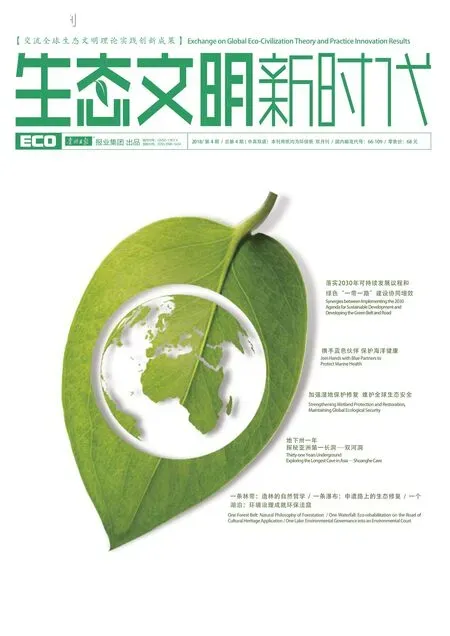落实2030 年可持续发展议程和绿色“一带一路”建设协同增效
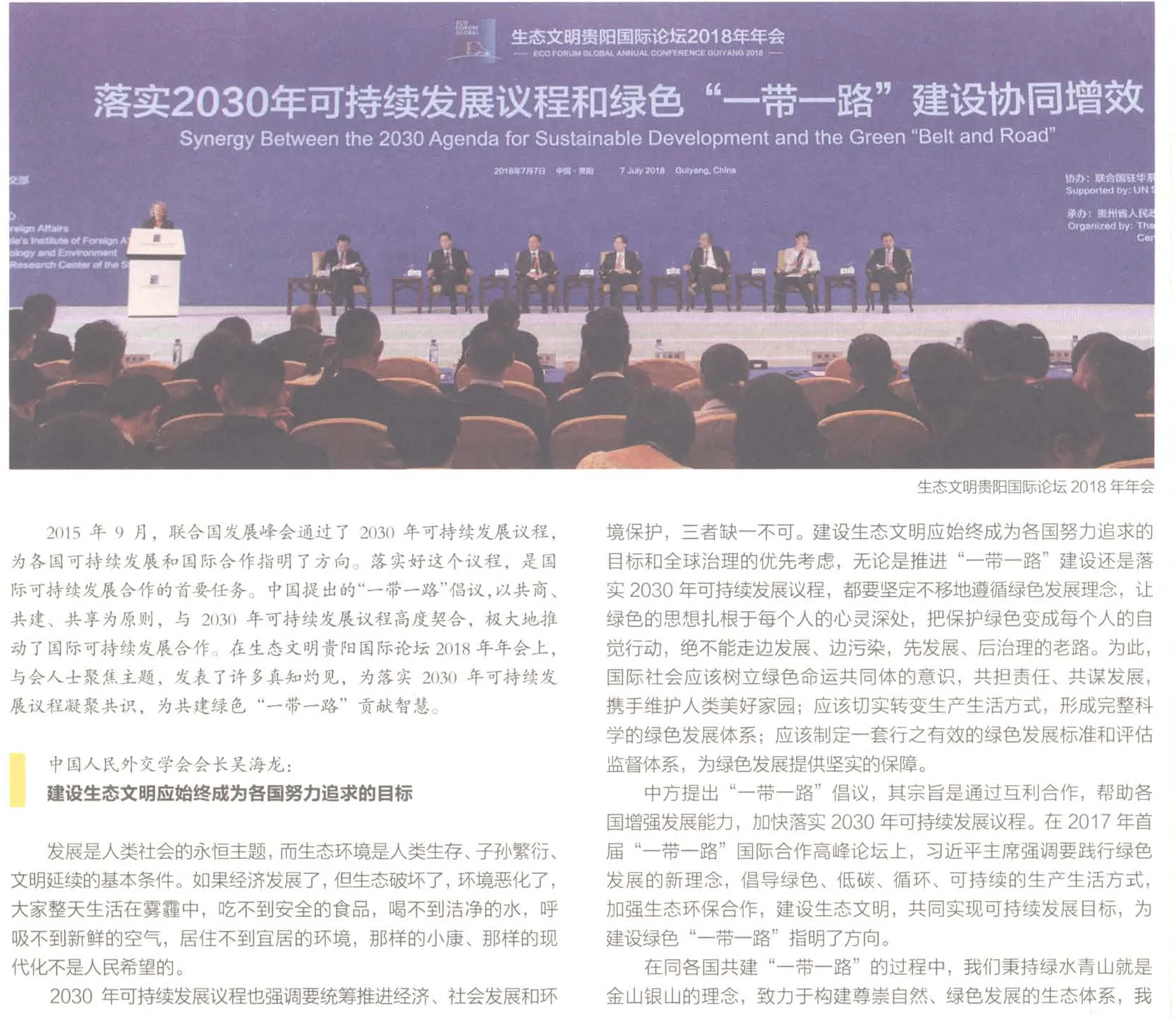
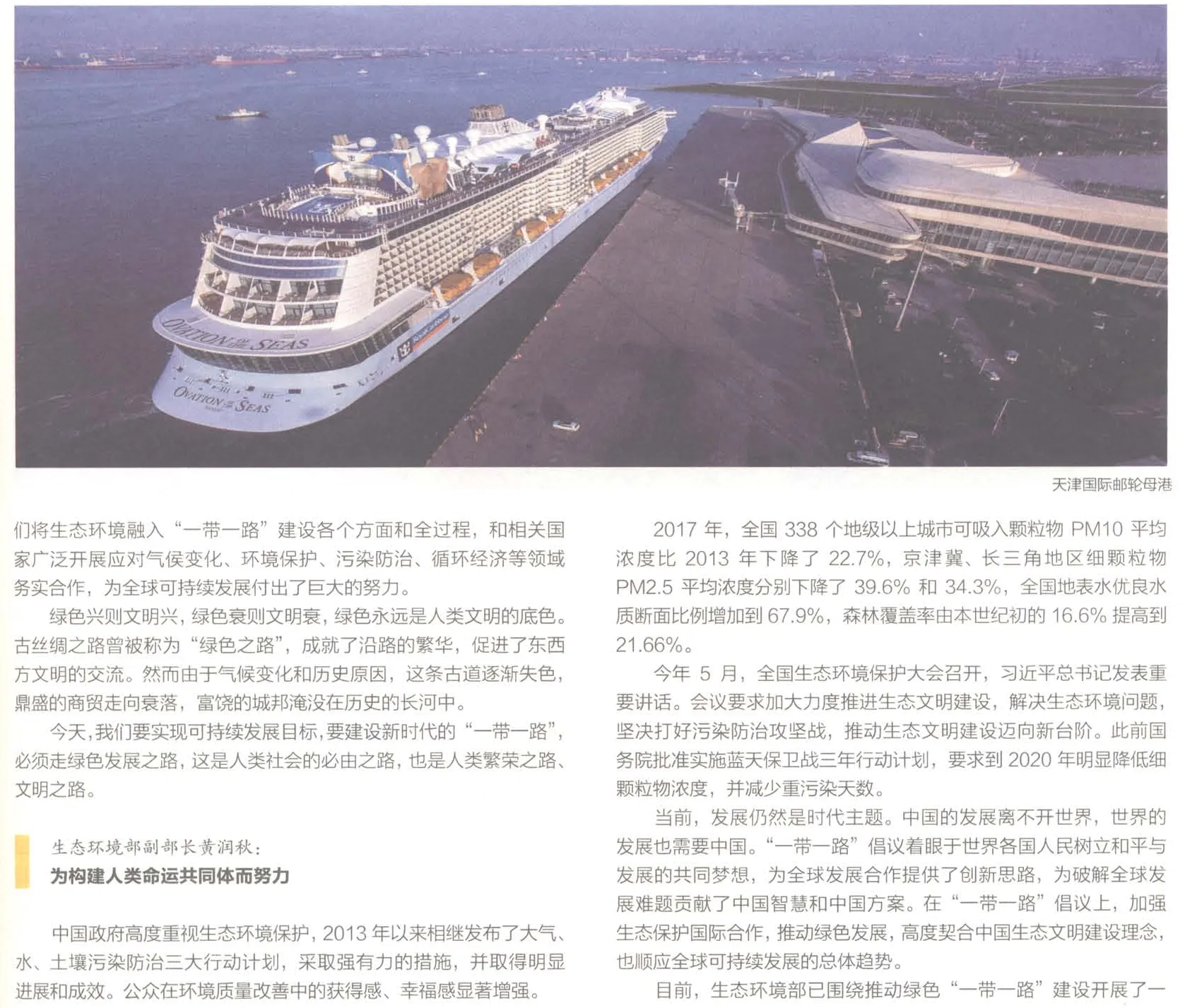
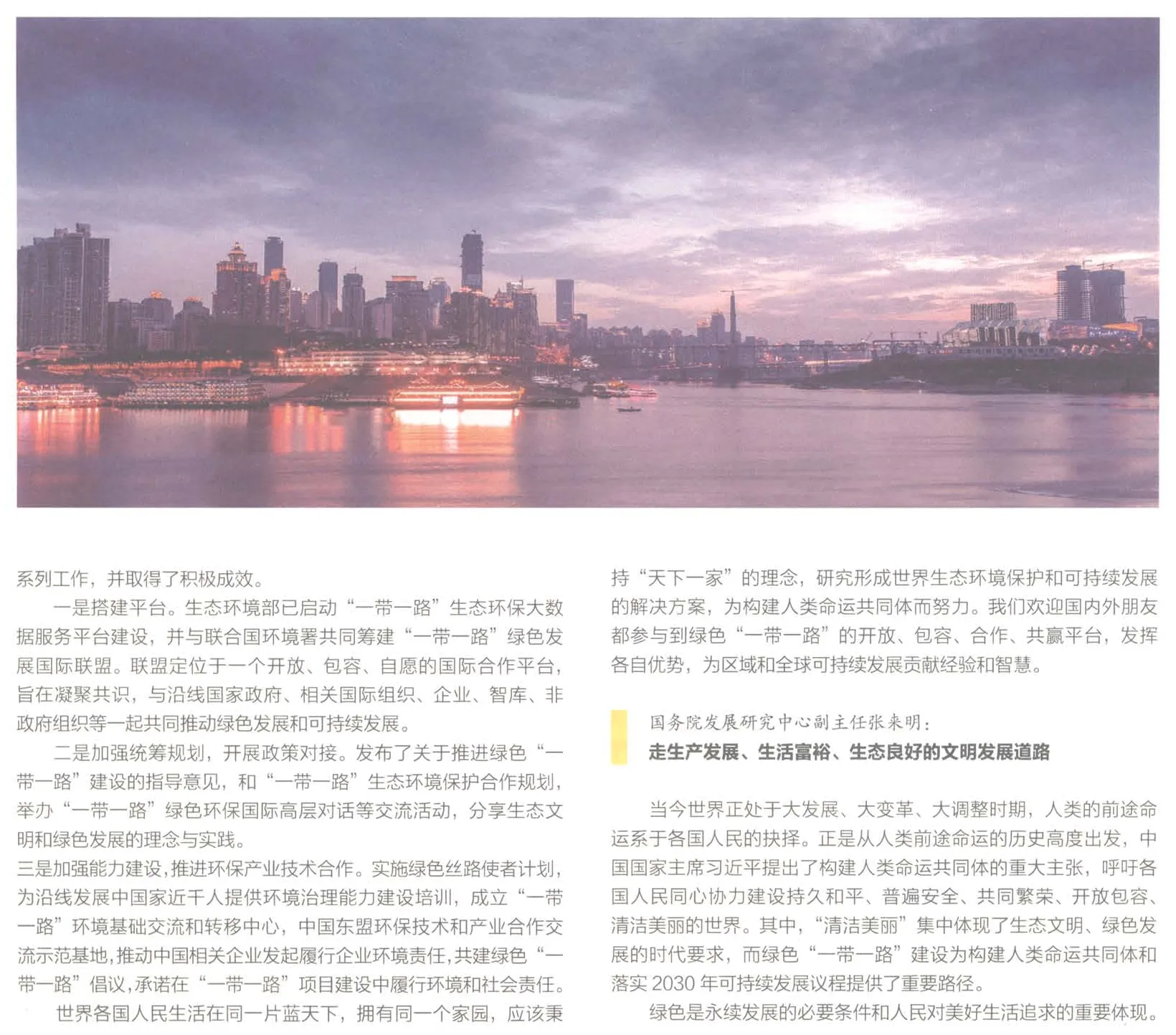

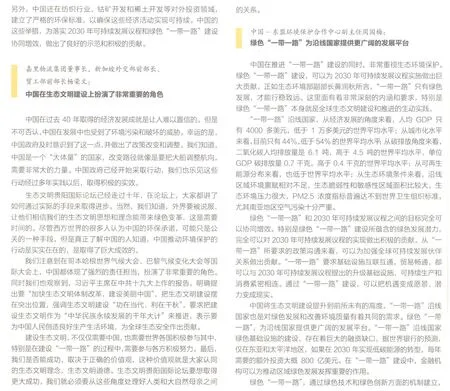


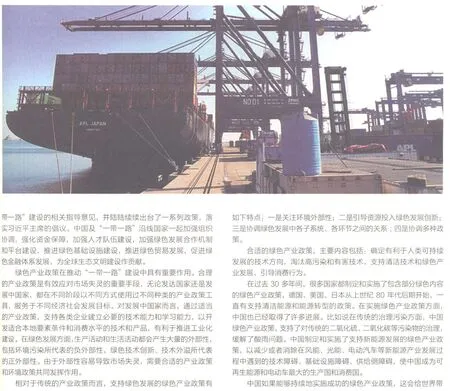
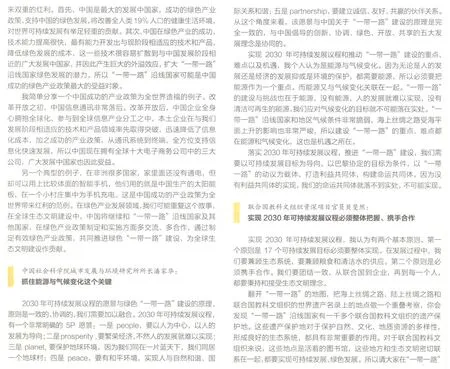
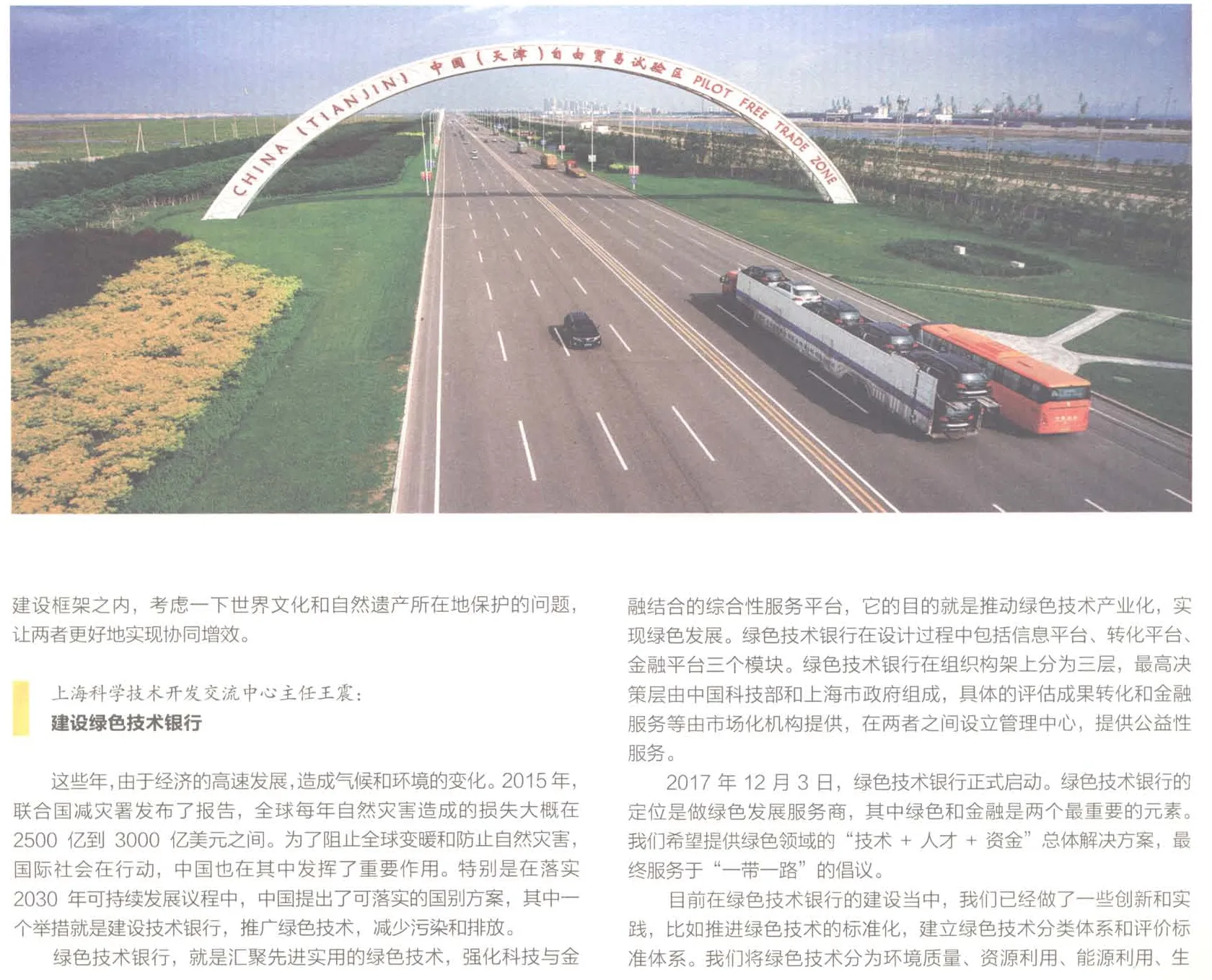
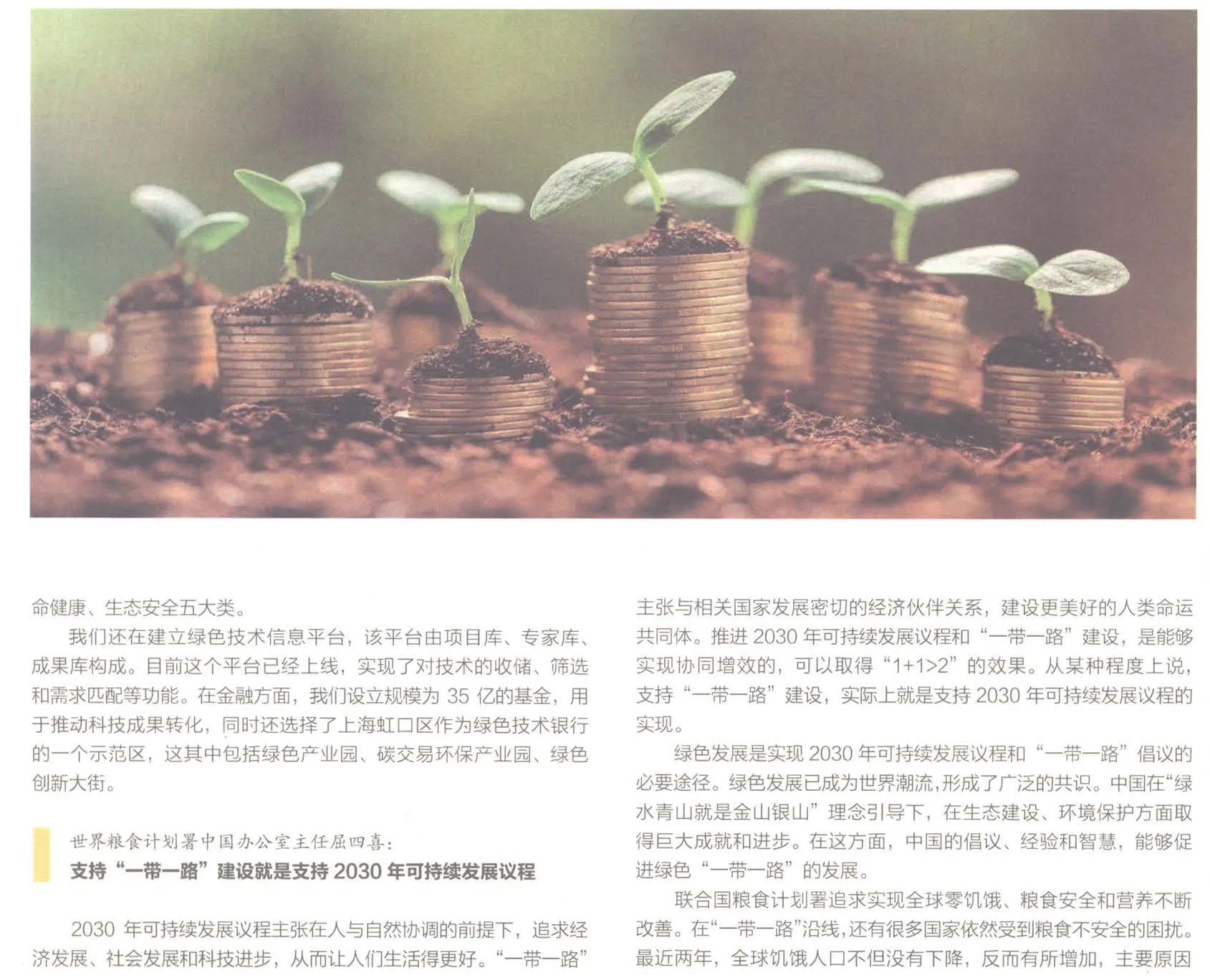
Synergies between Implementing the 2030 Agenda for Sustainable Development and Developing the Green Belt and Road

In September 2015, the United Nations Sustainable Development Summit adopted the 2030 Agenda for Sustainable Development, providing member countries with the direction for sustainable development and international cooperation. Implementing this Agenda is the primary task of international cooperation on sustainable development. The Belt and Road Initiative initiated by China, based on the principle of achieving shared discussion, shared construction and shared benefits, is highly consistent with the 2030 Agenda for Sustainable Development, in a way to greatly promote international cooperation on sustainable development. At the Eco Forum Global Annual Conference Guiyang 2018, the participants gave insights into the themes to build consensus for implementing the 2030 Agenda for Sustainable Development and contribute to the shared construction of the Green Belt and Road.
Wu Hailong, President of the Chinese People’s Institute of Foreign Affairs (CPIFA) Building Ecological Civilization Should Always Be a Goal Pursued by All Countries.
Development is an everlasting theme of human society. Ecological environment is the basic condition for human survival, offspring reproduction and civilization succession. If the economy develops at the cost of ecological damage and environmental deterioration, then we will live in haze every day,eat no safe food, drink no clean water, breathe no fresh air, and live with no favorable environment, which is not what our people expect of a well-off life and modernization.
The 2030 Agenda for Sustainable Development emphasizes the necessity to co-ordinate economic development, social development and environmental protection as an indispensable whole. Building ecological civilization should always be a goal pursued by all countries and a priority for global governance.Either to promote the construction of the Belt and Road or to implement the 2030 Agenda for Sustainable Development, we must unswervingly follow the concept of green development, root the idea of green in everyone’s mind,and change green protection into everyone's conscious actions. We will never take the old road of developing with pollution or developing before control. To this end, the international community should foster the sense of a common green destiny, share responsibility, seek common development, and work together to safeguard the beautiful homeland of mankind; it should effectively transform people’s living and producing styles and form a complete,scientific green development system; it should develop an effective set of green development standards and evaluation and supervision systems, to provide a solid guarantee for green development.
China has proposed the Belt and Road Initiative to help all countries enhance their development so as to accelerate the implementation of the 2030 Agenda for Sustainable Development. At the First Belt and Road Forum for International Cooperation in 2017, President Xi Jinping stressed that we should practice the new concept of green development, advocate green,low-carbon, circular, sustainable living and producing styles, strengthen cooperation on ecological and environmental protection, build ecological civilization, and achieve the Sustainable Development Goals together,providing the direction for developing the Green Belt and Road.
During the process of all countries jointly developing the Belt and Road, we have made great efforts for global sustainable development by adhering the idea that Lucid Waters and Lush Mountains Are Invaluable Assets, working to establish an ecological system that respects nature and green development,integrating the ecological environment into all aspects and the whole process of the Belt and Road development, and carrying out pragmatic cooperation with relevant countries on response to climate change, environmental protection, circular economy and other fields.
Green is key to civilization. It is always the foundation of human civilization.The ancient Silk Road, once known as the Green Road, had helped achieve prosperity along the road and exchanges between Eastern and Western civilizations. However, due to climate change and human factors, the ancient road gradually faded, booming commerce declined, and rich city-states became unknown, lost to history.
Today, if we want to achieve the Sustainable Development Goals and build the Belt and Road of the new era, we must take the road of green development,which is the only road for human society, as well as the road of human prosperity and civilization.
Huang Runqiu, Vice Minister of the Ministry of Ecology and Environment: Strive to Build a Community of Shared Future for Mankind
The Chinese government has attached great importance to the protection of the ecological environment. Since 2013, it has issued action plans for air, water and soil pollution control, taken powerful measures and achieved remarkable progress and results. The sense of well-being and happiness of the public has been significantly enhanced after environmental quality improvement.
In 2017, the average concentrations of PM10 in 338 prefecture-level cities and above were 22.7% lower than those in 2013, those of PM2.5 in Beijing-Tianjin-Hebei and Yangtze River Delta dropped by 39.6% and 34.3% respectively, quality surface water sections increased to 67.9%, and forest coverage increased to 21.66% from 16.6% at the beginning of this century.
In May this year, General Secretary Xi Jinping delivered a speech at the National Working Conference on Ecological Environment Protection. The meeting required that we should make greater efforts to promote ecological civilization construction, solve ecological environment problems, fight a hard battle against pollution, and push ecological civilization construction to a new stage. Recently, the State Council approved a Three-Year Action Plan for the Blue Sky Defense, which called for a significant reduction in the concentrations of fine particulate matters and a reduction in the number of heavy pollution days by 2020.
At present, development is still the theme of the times. China cannot develop without the world, and the world has to develop with China. The Belt and Road Initiative focuses on the peoples of the world, fosters a common dream of peace and development, provides innovative ideas for cooperation on global development, and contributes Chinese wisdom and Chinese solutions to global development. In the Belt and Road Initiative, the ideas of strengthening international cooperation on ecological protection and promoting green development is highly consistent with the concept of China's ecological civilization and the overall trend of global sustainable development.
So far, the Ministry of Ecology and Environment has carried out a series of work on promoting the construction of Green Belt and Road with positive results achieved.
First, building of platforms. The Ministry of Ecology and Environment has initiated the construction of the Belt and Road Eco-Environmental Big Data Service Platform, and prepared with the United Nations Environment Program to establish the International Alliance for the Green Belt and Road Development. As an open, inclusive and voluntary platform for international cooperation, the Alliance aims to build consensus and promote green development and sustainable development together with governments,relevant international organizations, enterprises, think tanks and non-governmental organizations along the Road.
Second, strengthened overall planning and coordination between policies. The Ministry has issued the guiding opinions on promoting the Green Belt and Road and the Belt and Road Cooperation Planning for Eco-Environmental Protection, held exchange activities such as the International High-level Dialogue on the Belt and Road Green Environment, and shared the ideas and practices of ecological civilization and green development.
Third, strengthened capacity building and promoted technical cooperation on environmental protection. The Ministry has implemented the Green Envoy Program for Silk Road by providing training on environmental governance capacity building to nearly 1,000 people in developing countries along the Road, establishing the Belt and Road Environmental Technology Exchange and Transfer Center and the China-ASEAN Demonstration Base for Environmental Technology and Industry Cooperation, and promoting relevant Chinese enterprises to initiate and fulfill their corporate environmental responsibilities, jointly develop the Green Belt and Road Initiative, and undertake to fulfill their environmental and social responsibilities in the construction of the Belt and Road projects.
People all over the world, living under the same blue sky and having the same home, should adhere to the concept of "We Are the World", study and form solutions for the protection and sustainable development of the world's ecological environment, and strive to build a community of shared future for mankind. We welcome friends at home and abroad to participate in the Green Belt and Road's open, inclusive, cooperative and win-win platform, to draw on their respective advantages and contribute experience and wisdom to regional and global sustainable development.
Zhang Laiming, Deputy Director of the Development Research Center of the State Council: Taking the Road of Civilized Development with Production Development, Prosperous Lives and Sound Ecology
Our world today is undergoing major development, major changes and major adjustments. The future and destiny of mankind depends on how people of all countries choose. It is precisely from the historical perspective of the future and destiny of mankind that Chinese President Xi Jinping has proposed a major proposal to build a community of shared future for mankind, to call on all peoples to work together to build a world of lasting peace, universal security,common prosperity, openness and tolerance, and cleanliness and beauty.“Cleanliness and beauty” embodies the requirements of the times for ecological civilization and green development. The Green Belt and Road development provides an important path for building a community of shared future for mankind and implementing the 2030 Agenda for Sustainable Development.
Green is a necessary condition for sustainable development and an important manifestation of people's pursuit of a better life. In the new development concept proposed by President Xi Jinping, green development is the core concept guiding China's ecological civilization construction and an important commitment for China to making new contributions to global ecological security. Green development has become not only a defined direction for China's own development, but also an important connotation of China's foreign cooperation. In May 2017, at the Belt and Road Forum for International Cooperation, President Xi Jinping stressed that we should advocate green, low-carbon, circular, sustainable living and production styles,strengthen ecological and environmental cooperation, and build ecological civilization, so as to jointly achieve the Sustainable Development Goals by 2030. He also initiated the establishment of the International Alliance for the Green Belt and Road Development and helped relevant countries in response to climate change.
The development concept determines the development pattern. Under the traditional concept of development formed after the industrial revolution,economic development has been largely based on high resource consumption,high carbon emissions and high environmental damage. Under the concept of green development that Lucid Waters and Lush Mountains Are Invaluable Assets, environmental protection and economic development can promote and complement each other. Guizhou's practice has fully proved this point.Integrating green development into the Belt and Road development provides new impetus for implementing the 2030 Agenda for Sustainable Development and new opportunities to the development of relevant countries.
Building the Green Belt and Road and implementing the 2030 Agenda for Sustainable Development requires all countries to work together. In cooperation promotion, the key is to allow for the following points.
First, stick to development as the top priority. We should effectively connect the 2030 Agenda for Sustainable Development with China's national development strategy, and unswervingly take the road of civilized development with production development, prosperous lives and sound ecology.
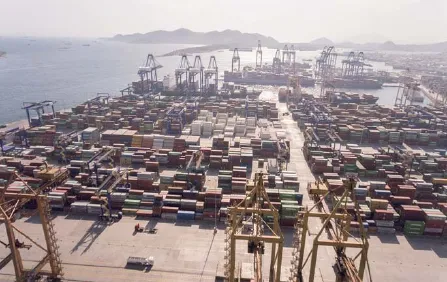
Second, stick to the correct ideal of righteousness and profits. In addition to seeking to economic interests, we should uphold the fairness and justice of human society, improve the global economic governance system and constantly strengthen global partnerships for development.
Third, stick to the principle of common but differentiated responsibilities. We should urge developed countries to abide by their commitments and increase their financial and technological support to developing countries.
Fourth, stick to equality, mutual benefit, cooperation and mutual benefits. We should strengthen South-South cooperation, promote exchanges and mutual construction of development experience and knowledge among the countries of the Global South, and actively promote the unity and self-improvement of developing countries.
In September 2015, President Xi Jinping announced at the United Nations Sustainable Development Summit that China would establish the Center for International Knowledge on Development to study and exchange development theories and practices suited to their respective national conditions with other countries. In August 2017, China's Center for International Knowledge on Development was officially established. President Xi Jinping and the United Nations Secretary-General Guterres, sent congratulatory letters. President Xi Jinping said explicitly that the Center for International Knowledge on Development would make positive contributions to promoting cooperation on international development and facilitating the Agenda for Sustainable Development. The Development Research Center of the State Council, the Center for International Knowledge on Development and other sides concerned at home and abroad will strengthen cooperation to contribute to promoting green development and implementing the 2030 Agenda for Sustainable Development.
Luo Shili, UN Resident Coordinator: The Belt and Road will Serve as an Accelerator to the Agenda for Sustainable Development
Synergies between implementing the 2030 Agenda for Sustainable Development and developing the Green Belt and Road are a task of great importance to the United Nations. Integrating the concept of green development into the Belt and Road development, and ensuring that the Belt and Road project will bring economically and environmentally sustainable results, will provide a new impetus for the 2030 Sustainable Development Goals. So far, 15 UN agencies and relevant Chinese agencies have signed agreements with respect to the Belt and Road. The core of these agreements is to create synergies between the 2030 Agenda for Sustainable Development and the Green Belt and Road.
The Belt and Road will serve as an accelerator to the Agenda for Sustainable Development; despite some differences in scope and nature, the two plans share multiple aspects in common, including visions and basic principles, said the UN Secretary-General Guterres.
The 2030 Agenda for Sustainable Development, adopted by UN member states in 2015, is a list of actions for the benefits of mankind and the planet and a blueprint for success, including 17 Sustainable Development Goals and 139 Segmenting Indexes, to call on all countries to protect the planet while achieving development. The Agenda calls for economic development to be integrated with poverty alleviation, education, health, employment and other undertakings and active response to climate change in development, so as to ensure effective environmental protection.
In short, the 2030 Agenda for Sustainable Development regards sustainable development as the core. Sustainable development includes social sustainable development and environmentally sustainable development. The Belt and Road aims to achieve common development, peace and cooperation, openness and inclusiveness, as well as mutual understanding and trust among all countries. The Belt and Road covers a population of 4.4 billion and a production size of USD 21 trillion, which can greatly contribute to the achievement of Sustainable Development Goals.
If we want to achieve the success of the Belt and Road, and if we want to make the most of this "accelerator effect", we must facilitate inclusive development in countries and regions along the Belt and Road and protect the ecological environment while developing the economy. In practice,decision-makers of both investors and investment recipients should properly select "green" investment and projects, and ensure sustainable development throughout the life cycle of investment. The framework of Sustainable Development Goals can help investors select, plan for and execute projects,manage risks and ensure that developing such projects will not have a negative impact on the environment.
A number of chambers of import and export trade in China have set social responsibility indexes for foreign-invested enterprises to guide the investment and use of natural resources, and require enterprises to follow sustainable development. In addition, China has also established stringent environmental standards for foreign investment in textile, cobalt ore development and Tombarthite development to ensure the sustainability of these economic activities. Such of China's measures have set good demonstrations and made positive contributions to synergies between implementing the 2030 Agenda for Sustainable Development and developing the Green Belt and Road.
Yang Rongwen, Chairman of Kerry Logistics Group, former Minister of the Ministry of Foreign Affairs of Singapore and former Minister of the Ministry of Trade and Industry Singapore: China Plays a Very Important Role in Ecological Civilization Construction
It is unbelievable of the achievements China has made in its economic development over the past 40 years. But it is undeniable that China is also threatened by environmental pollution and destruction in its development.Fortunately, the Chinese government has realized this in a timely manner and made policy changes and adjustments. We know that China is a big country.Changing the path is like adjusting the course of a big ship, which takes a lot of power. The Chinese government has begun to take actions, and we are happy to see that these actions have achieved positive results after years of practice.
In 2015, a female journalist who left CCTV filmed a documentary called Under the Dome about China's real environmental pollution problems. This documentary gained 300 million hits on the Internet within one week, drawing wide attention from the public. Over the years, China has implemented corresponding solutions to these problems. Many people visiting China can feel that some cities and villages are solving the current environmental problems, so we still have to hope for this.
Eco Forum Global Guiyang has been held for ten years. At the forum, all are talking about how to make progress through practical means. Of course, we know that it takes time for the outside world to be convinced that our ecological civilization thoughts and ideas can lead to a green revolution.Although many people in the Western world tend to consider China's environmental commitments as a possible means of public relations, people who really know about China know that China's actions to promote environmental protection are real and have achieved great results.
We note that China has demonstrated its strong responsibility and played a very important role at international conferences like the Copenhagen Climate Conference and the Paris Climate Change Conference. At the same time, we also observe that Xi Jinping's report at the 19th National Congress of the Communist Party of China clearly proposed to "speed up the reform of the ecological civilization system and build a beautiful China" to put ecological civilization construction in a prominent position, emphasized ecological civilization construction as "paining for the moment and gaining for the millennia", required ecological civilization construction to be promoted as the"millennium plan for the sustainable development of the Chinese nation", and said that we should create a good living and production environment for the Chinese people and contribute to global ecological security.
Building ecological civilization requires not only China but also the other countries to participate in. Positive efforts of all sides are required especially in the Belt and Road construction. Finally, whether we can succeed or not depends on the right values, which are the well-accepted ecological civilization concept and morality. If Eco Forum Global Guiyang is to be even more successful, we must deal with the relationship between humankind and Mother Nature from these perspectives.
Zhou Guomei, Deputy Director of the China-ASEAN Environmental Cooperation Center: The Green Belt and Road Provides a Broader Development Platform for Countries along the Road.
While promoting the Belt and Road development, China attaches great importance to ecological environment protection. Developing the Green Belt and Road can make a huge contribution to implementing the 2030 Agenda for Sustainable Development. As Huang Runqiu, Vice Minister of the Ministry of Ecology and Environment, put it, the Belt and Road can only go far and steadily with green development. There is a very profound connotation and requirements here. Especially the Green Belt and Road itself is a vivid practice of global ecological civilization construction and promotion.
From the perspective of economic development, per capita GDP of countries along the Belt and Road is just over USD 4,000, less than the world's average over USD 10,000; from the perspective of urbanization, it is only 44%currently, lower than the world's average 54%; from the perspective of carbon dioxide emissions, per capita carbon dioxide emissions are 6.1 tons, higher than the world's average 4.5 tons and per unit GDP carbon dioxide emissions are 0.7 kg, higher than the world's average 0.4 kg; from the perspective of the distribution of renewable energy, it is also lower than the world's average level;from the perspective of the ecological environment conditions, due to inadequate environmental endowment, ecological vulnerability, large sensitive areas and high ecological environment pressure, PM2.5 concentrations generally fall short of WHO standards, especially in South Asia with serious air pollution.
Goals between the Green Belt and Road and the 2030 Agenda for Sustainable Development are completely synergistic. Especially the green development potentials of the Green Belt and Road development can be positively contributing to implementing the 2030 Agenda for Sustainable Development.From the perspective of policy communications required by the Belt and Road, they can contribute to strengthening the global partnership for sustainable development. The Belt and Road requires interconnected infrastructure and smooth trade, to be closely connected to upgraded infrastructure, sustainable production and consumption proposed for the 2030 Agenda for Sustainable Development. It is possible to turn opportunities into visions and potentials into the reality through the Belt and Road development.China has lifted ecological civilization construction to an unprecedented height. Countries along the Belt and Road share common demands for green development and environmental improvement. The Green Belt and Road provides a broader development platform for countries along the Road. There is a huge financing gap for the construction of green infrastructure in countries along the Belt and Road. According to the World Bank estimates, it will take some USD 80 billion additional investment every year to achieve low-carbon energy transition by 2030 in East Asia and the Pacific alone. In the Belt and Road development, financial institutions can be important in promoting regional green development.
For the Green Belt and Road, it is fully possible to promote low-carbon,environmentally friendly technologies and green infrastructure construction by establishing mechanisms for green technology and green innovation; it is also possible to build a green industry chain, a green value chain, and then create a shared green community.
For the Green Belt and Road, it is also possible to create many other social and economic benefits, eradicate poverty, promote social equity, create jobs, and upgrade the vocational skills of the local labor force. For example, during the construction of the Mombasa-Nairobi Railway, great attention was paid to ecological protection to make it a green mark on the land of Africa. To promote the major project in the Lancang-Mekong River Basin, great importance was attached to ecological protection, poverty eradication, and well-being improvement for people along the river, which is an important aspect for developing the Green Belt and Road.
We are now actively implementing the two collaborative initiatives proposed by President Xi Jinping last year at the Belt and Road Forum for International Cooperation: building the Eco-Environmental Big Data Service Platform and the International Alliance for the Green Belt and Road Development.
The Belt and Road Eco-Environmental Big Data Service Platform aims to collect ecological conditions, policies, regulations, standards, technologies and green industry development conditions on countries along the Road with the help of information technologies such as "Internet + Big Data", so as to promote information sharing, data sharing, knowledge sharing and conference sharing. The International Alliance for the Green Belt and Road Development,to be co-sponsored by the Ministry of Ecology and Environment and the United Nation Environment Program, aims to bring together groups in connection with various aspects of the Green Belt and Road development, so as to jointly promote collaboration. The Big Data Service Platform, an online data and knowledge platform, and the Alliance for Green Development, an offline entity cooperation platform, are two very important driving forces for promoting the Green Belt and Road development that supplement each other.Eco Forum Global Guiyang, as a very high-end and pragmatic platform, can be very important and positive in developing the Green Belt and Road. In particular, Guizhou may serve as important technical support for the construction of the Belt and Road Eco-Environmental Big Data Service Platform based on its advantages in building the national ecological civilization pilot zone and developing big data.
Despite unpredictable international climate and the rise of trade wars, the circle of friends of the Green Belt and Road will grow larger and larger, and the groups for ecological civilization and green development will become more and more vigorous.
Rokanas, Ambassador of Greece to China: The Belt and Road is a Plan to Achieve Coordinated Development.
In Greek, the word "ecology" means to take care of your home, that is, to take care of your surroundings first and manage your own home in a reasonable way. The "ecological civilization" we are talking about requires us to foster ecological thinking, ecological ethics, and to deal with the relationship between human and nature, between human and climate, which is a new civilization, a global civilization, applicable to today and, more importantly, the future.
Why did China propose and build ecological civilization? My understanding is that this is a strategic choice China has made from the perspective of the process of human social development, facing the future and serving future generations. Especially after the 19th National Congress of the Communist Party of China, we can deeply feel that China's economic development will shift from quantity to quality and improve people's living standards through economic development. Building ecological civilization aims to improve people's living standards. I hope that China will, as always, strengthen the spread of ecological civilization throughout the world.
Greece is a country along the Belt and Road, an important hub of the Maritime Silk Road, and an important stop of the Land Silk Road. We think that the Belt and Road is a comprehensive plan, a plan for coordinated development that involves economy, culture, and other things connecting people. Green and ecology are important components of the Belt and Road development.
Last year, I accompanied the Greek Prime Minister to the Belt and Road Forum for International Cooperation. If you read the Joint Communique of the Round Table Summit of the Belt and Road Forum for International Cooperation, much of it was about sustainable development. So, what specifically can we do? We can expand the influence of ecological civilization on the global at the political level and promote global ecological governance;we can carry out cultural exchanges so that ecological civilization will be more widely known by a wider population and become an integral part of people's daily lives.
Gao Shiji, Director-General of the Institute for Resources and Environment Policies, Development Research Center of the State Council:Promoting the Green Belt and Road Development with Green Industry Policies
Green development and ecological civilization construction have become common goals of all countries and an important part of global governance.They are inevitable choices to enhance the momentum of sustainable, healthy economic development and achieve the 2030 Sustainable Development Goals and even the sustainable development of mankind.
President Xi Jinping emphasized at the Belt and Road Forum for International Cooperation in 2017 that we should work together to promote the Belt and Road development and green development. He initiated the International Alliance for the Green Belt and Road Development, and called on countries along the Road and the international community to strengthen cooperation on ecological environment protection, practice the idea of green development and take green, low-carbon, circular, sustainable living and production styles.We are glad to see that China's relevant government departments have published relevant guiding opinions to promote the Green Belt and Road development, and issued a number of policies to implement President Xi Jinping's initiative. China will work with relevant international organizations and countries along the Belt and Road to intensify organizational coordination,strengthen financial security, improve the building of talent teams and green development cooperation mechanisms and platforms, promote green infrastructure construction, green trade development and green financial system development, so as to contribute to global ecological civilization construction.
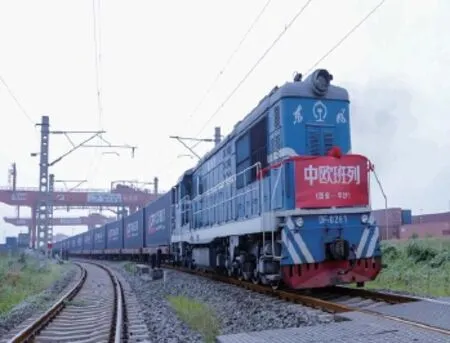
Green industry is important in promoting the Belt and Road development.Reasonable industry policies are an important means to effectively deal with market failure. Both developed and developing countries have used different industrial policy tools in different stages and in different ways to serve different economic and social development objectives. For developing countries, proper industry policies should be adopted to support enterprises to establish the necessary technological and learning capacity to develop technologies and products suited to local factors and consumption levels, to the best advantage of promoting industrialization. For green development, production and living activities will produce a lot of externalities, including negative externalities represented by environmental pollution and positive externalities represented by green technology innovation and technology spillovers. Because externalities easily lead to market failure, proper industrial and environmental policies are needed to work together.
Compared with traditional industry policies, green industry that supports green development has the following characteristics: first, it pays attention to environmental externalities; second, it guides resources to green development innovation; third, it coordinates the relationship between various subsystems and links in green development, and fourth, it coordinates multiple policies.
Proper green industry policies include: determining the direction of technologies that help sustainable human development, eliminating high-polluting and harmful technologies, supporting the development of clean technologies and green industries, and guiding consumer behaviors.
Over the past 30 years, many countries have formulated and implemented green industry policies with some green connotation. Germany, the US and Japan have been supporting clean energy and energy transformation policies since the late 1980s. China has made much progress in implementing green industry. For example, in the traditional pollution control, China's green industry policies have supported the traditional treatment of sulfur dioxide,carbon dioxide and other pollutants, enabling China to achieve economic growth at a low per capita GDP completely without having to generate sulfur dioxide and carbon dioxide, to the extent to alleviate acid rain. China has formulated and implemented green industry policies to support the development of new energy sources, so as to reduce or eliminate technical barriers, infrastructure barriers and supply-side barriers encountered in developing such energy sources as wind and light and electric vehicles,making China the largest producer and consumer of renewable energy and electric vehicles.
If China continues to implement successful green industry policies, it will bring double profits to the world. First, as China is the largest developing country, successful green industry policies that support China's green development will improve the healthy living environment of 19% of the human population and contribute much to the world's sustainable development. Second, China's success in green industry has greatly improved its technical capacity. It is most possible for China to develop technologies and products suited to the current stage and reduce the costs of green development.These technologies can easily spread to the vast number of developing countries similar to China's development stage, generating a huge spillover effect and enlarging the great green development potentials of countries along the Belt and Road. So these countries along the Belt and Road may be the biggest beneficiaries of China's successful green industry policies.
I would like to share with you an example of how China's successful industry policy has benefited the whole world. China tends to issue successful communications policies. At the beginning of the reform and opening up,China's communication industry was very outdated; but since then, Chinese enterprises started to embrace globalization and participate in global division of IT. Local enterprises took the lead in making breakthroughs in technologies and products suited to our development stage, rapidly lowering information costs. Besides, successful industry policies, from communications systems to terminals, fully support the rapid development of information, so China now has three big giants listed in the world's top ten e-commerce companies,benefiting the vast number of developing countries.
Another typical example is many African countries. Electricity is not yet available to everyone' home. They use decent smartphones and get them recharged at a village where solar panels are used to generate power. This is an example of how China's successful industry policy has brought profits to the whole world. In green industry development, we may repeat this story. In global ecological civilization construction, China will continue to exchange and cooperate with countries along the Belt and Road and other countries on formulating and implementing green industry policies. We will work together to promote the Green Belt and Road development by formulating effective green industry policies and coordinating green industry policies and environmental policies, so as to contribute to global ecological civilization construction.
Pan Jiahua, Director of the Institute for Urban and Environmental Studies,Chinese Academy of Social Sciences: Taking Energy and Climate Change as a Key Opportunity
We will integrate the 2030 Agenda for Sustainable Development and the Green Belt and Road development that share visions and principles. The 2030 Agenda for Sustainable Development has a very clear 5P vision: first, people,people-centered, human development-oriented; second, prosperity, we need economic prosperity to help achieve human development; third, planet, we need to protect the environment on earth, because we live together in the same global village under the same blue sky; fourth, peace, we need a peaceful environment to achieve harmony between human and nature and harmonious international relations; fifth, partnership, we need to build honest, friendly and win-win partnerships. Seen from this perspective, the vision is completely consistent with China's principle of the Belt and Road development, and synergistic with China's development concepts: innovation, coordination,green, openness and sharing.
I personally think energy and climate change are the key points, difficulties and opportunities that help implement the 2030 Agenda for Sustainable Development and promote the Belt and Road development. As human development, economic development and environmental protection, all need energy, we must take energy as a priority. And energy is also associated with climate change. The construction and challenges of the Belt and Road also lie in energy. Without energy, human development will be impossible. Without clean and renewable energy, our goal of tackling climate change cannot be implemented. Given very fragile climate conditions in countries and regions along the Belt and Road and severe impact of the sea level rise on the Maritime Silk Road, the key points and difficulties of building the Belt and Road lie in energy and climate change, which can also be opportunities.
To implement the 2030 Agenda for Sustainable Development and promote the Belt and Road development, we need to build a community of shared interests and a community of shared future, guided by the Sustainable Development Goals, conditioned by the aims of the Paris Agreement and based on the Belt and Road motion. Without the realization of a community of shared interests, our community of shared future cannot be implemented or achieved. Clean and sustainable energy and climate security are the common interests of us mankind, as well as the common interests of all countries, so we need to act together.
Philippe Pypaert, Senior Project Officer at the UNESCO To Achieve the 2030 Agenda for Sustainable Development,We Must Overall Grasp and Cooperate Together
Personally, I think there are two basic principles for achieving the 2030 Agenda for Sustainable Development. The first principle is that the 17 Sustainable Development Goals must be implemented as a whole. During development, we should allow for ecosystems and the supply of food and clean water. The second principle is that we must work together. We need to unite and embrace the concept of ecological civilization, from the United Nations, to enterprises, and to everyone.
Open the map of the Belt and Road, explore the Maritime Silk Road, the Land Silk Road and sites in the World Heritage List, and you will find that there are more than 1,000 UNESCO heritage sites in countries along the Belt and Road.They are very important in protecting the diversity of natural, cultural and geological resources and forming good ecosystems. For the UNESCO, these sites are like a living library, connecting these regions and ecological civilization to achieve sustainable development and green development. So, I want you all to consider the protection of these sites of the world's cultural and natural heritage in the framework of the Belt and Road development so that both can achieve better synergies.
Wang Zhen, Director of Shanghai Science and Technology Development and Exchange Center: Building Green Technology Bank
Over the years, climate and environment changes have occurred due to rapid economic development. According to a report from the UNISDR in 2015, 250 to 300 billion US dollars are lost every year due to natural disasters. In order to prevent global warming and natural disasters, the international community is acting, and China has played an important role in it. Especially in the implementation of the 2030 Agenda for Sustainable Development, China has proposed feasible national programs, one of which is to build a technology bank to promote green technologies and reduce pollution and emissions.
Green Technology Bank, a comprehensive service platform that gathers advanced and practical green technologies and strengthens the integration of science & technology and finance, aims to promote the industrialization of green technologies and achieve green development. In the design process,Green Technology Bank includes three modules: information platform,transformation platform and financial platform. It has three levels in organizational structure: the top decision-making level, composed of the Ministry of Science and Technology of China and the Shanghai Municipal Government, market-oriented organizations to provide specific evaluation results and financial services, and a management center between the two to provide public welfare services.
On December 3, 2017, Green Technology Bank was officially established. It is positioned as a green development service provider, in which green and finance are the two most important elements. We hope that it will provide the overall solution of "technology + talents + funding" in the green sector, and ultimately serve the Belt and Road Initiative.
So far, some innovations and practices have been carried out in the construction of Green Technology Bank, including promoting the standardization of green technologies, establishing the classification system and evaluation standard system for green technologies. We divide green technologies into five categories: environmental quality, resource utilization,energy utilization, life and health, and ecological security.
We will also build a green technology information platform, which consist of project library, expert database and result library. Now this platform has been put into operation to achieve functions including the storage, screening and matching of technologies. In finance, we have set up a USD 3.5 billion fund to promote the transformation of scientific and technological achievements.Meanwhile, we have chosen Hongkou District, Shanghai as a demonstration area of Green Technology Bank, which includes Green Industrial Park,Carbon Trade Environmental Protection Industrial Park and Green Innovation Street.
Qu Sixi, Director of the China Office of the World Food Programme:To Support the Belt and Road Development is to Support the 2030 Agenda for Sustainable Development
The 2030 Agenda for Sustainable Development advocates the pursuit of economic development, social development and scientific and technological progress under the premise of a harmony between human and nature, so that people can live better. The Belt and Road advocates a close economic partnership with relevant countries to build a better community of shared future for mankind. Advancing the 2030 Agenda for Sustainable Development and the Belt and Road development is to achieve synergies and achieve the effect of "1+1>2". To some extent, supporting the Belt and Road development is actually to support the implementation of the 2030 Agenda for Sustainable Development.
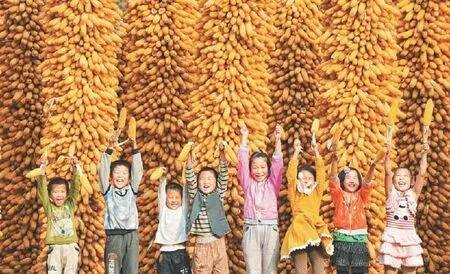
Green development is a necessary way to achieve the 2030 Agenda for Sustainable Development and the Belt and Road Initiative. Green development has become a global trend and gained a broad consensus. Under the guidance of the idea that Lucid Waters and Lush Mountains Are Invaluable Assets, China has made great achievements and progress in
ecological construction and environmental protection. In this regard, China's initiatives, experience and wisdom can promote the Green Belt and Road development.
The UN World Food Programme seeks to achieve zero global hunger, food security and improved nutrition. Many countries along the Belt and Road still suffer from food insecurity. Over the past two years, the number of starved people in the world has increased other than declined, mainly because of human-induced conflicts and frictions in some regions and frequent natural disasters and reduced food production in some regions.
Since the UN World Food Programme came to China in the late 1970s, it has carried out many projects in cooperation with China, including afforestation,water and soil conservation projects in Bijie, Anshun and Tongren, Guizhou.
Under the new circumstances, the World Food Programme has started new cooperation with China, promoting the Green Belt and Road from the following aspects.
In promoting policy communications, we can share the relevant policies and practices of China's green development. In the direction of promoting people's livelihood, we can share Chinese technology, implement the project of cultivating agriculture and forestry leaders in developing countries, encourage young people from other countries to come to China for studies, and then go home to start their own businesses to lead local farmers. In terms of welfare-to-work (providing work as a form of relief), we can contribute directly to the construction of the Belt and Road infrastructure projects. In creating more investment and trade opportunities, we can work together with more Chinese companies that have gone global to start South-South cooperation.
"He who travels alone goes fast, but he who travels in company goes far." The UN World Food Programme is willing to work with Chinese partners and international partners to make our joint efforts to build a world free of hunger and with no one left behind.
Zhang Yongsheng, Deputy Director of the Strategy and Regional Economic Research Department, Development Research Center of the State Council: Ecological Civilization Proposed by China is a Major Innovation
The 2030 Agenda for Sustainable Development is very exciting, but without a fundamental change in the development paradigm, it is likely to be just a good wish. If you look closely at the 17 goals of this Agenda, you will find that no one goal is very strange. In fact, every goal is what we have been pursuing.
Then why are these 17 goals not achieved? Although related to the development stage, this is not the main cause. Because the developed countries have not achieved them, too. The fundamental reason lies in the development model established after the industrial revolution. From the internal and fundamental point of view, their economic development is somewhat conflicting with their environmental, cultural and social development. If we want to achieve these goals at the same time, we must achieve a fundamental change in the development paradigm, from concept to model. Then economic development and environment, culture, etc. will form mutually promoting relationships, so that we can achieve the 2030 Sustainable Development Goals.
China has proposed ecological civilization and the new development concept.This is a major innovation. China is actually leading the world in this respect,and it is very likely to make a greater contribution to the world in exploring new development models, especially through the Belt and Road.
In developing the Green Belt and Road, China's advocacy and dissemination of ecological civilization and the new development concept is very convincing.What these countries along the Belt and Road, especially the least developed countries, need most in the poorest period is to develop their economies, and may not care about culture, environment, etc. But if China tells them based on its own successful practice that green development is better than the old road of traditional industrialization, I believe that those countries will adopt China's good practices and good experience. China's green development model can help these less developed countries along the Belt and Road achieve leapfrog development.
Ecological civilization and green development are the most comprehensive and most profound change after the industrial revolution. They are new things to all developed and developing countries that need our thinking model innovation, theoretical innovation and technological innovation and require us to break away from traditional industrial framework and logic and form a new green development paradigm.

